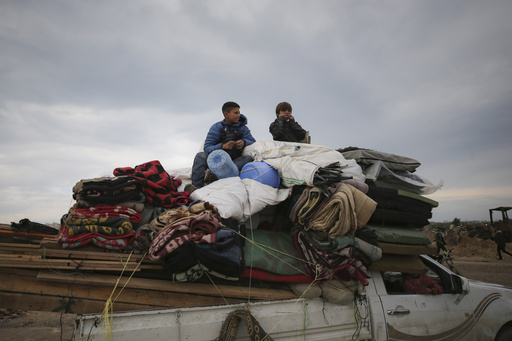
JERUSALEM — The ongoing situation involving Hamas has cast a shadow over a delicate ceasefire that some believe could lead to an end to the conflict. The militant group has threatened to postpone the upcoming release of Israeli hostages from the Gaza Strip, a development met with alarm from the Israeli public. Over the weekend, three severely malnourished men were handed over, intensifying concerns as Israel has reported that eight of the remaining seventeen hostages are already confirmed dead.
President Donald Trump reacted to the threat from Hamas, suggesting that the ceasefire should be ended if the remaining hostages are not freed by midday on Saturday. He clarified that it was ultimately Israel’s decision regarding the ceasefire. Hamas dismissed Trump’s comments, stating that the release of hostages would depend on a commitment from all parties to uphold the ceasefire terms.
The next scheduled handover, expected to occur on Saturday, has heightened anxiety for families of those still unaccounted for, raising the urgency of the situation. Following Hamas’s announcement on Monday, Israeli officials are awaiting the results of a hastily arranged security Cabinet meeting.
Meanwhile, the developments have led to heightened anxiety in Gaza, where thousands of displaced Palestinians have returned to the north of the territory after initially fleeing during the war’s early stages. The uncertainty regarding the hostages complicates negotiations for the second phase of what is intended to be a six-week ceasefire, jeopardizing the pause in combat and the humanitarian assistance currently being delivered to Gaza.
Persistent fears linger that fighting could resume once the first phase wraps up in early March. Hamas has accused Israel of not adhering to the terms of the ceasefire, citing initial delays in the return of Palestinians and military strikes across the territory. The group stated it would delay the next hostage release “until further notice.”
Israeli Defense Minister Israel Katz denounced the delay as a “complete violation” of the ceasefire agreement and directed the military to remain on high alert. The coordinator for hostages indicated that the Israeli government remains committed to fulfilling its obligations under the agreement.
In a later statement, Hamas referred to the postponement as a “warning signal” to Israel, emphasizing that mediators from the United States, Qatar, and Egypt have five days to apply pressure on Israel to comply with its commitments. The statement also noted that the possibility for the exchange to proceed as planned remains open if Israel upholds its side of the agreement.
As the situation unfolds, President Trump has revived a controversial proposal to displace the Palestinian population from the devastated Gaza region, proclaiming that the U.S. should take “ownership” of the territory. His remarks deepened the distress among Palestinians, who bear the historical weight of being forcibly displaced during the 1948 conflict. His statements have also drawn renewed condemnation from Arab nations advocating for an independent Palestinian state.
Trump’s declaration seemed contradictory to comments made by his administration, which harbored a more temporary view of Palestinian relocation. Hamas has consistently criticized Trump’s Gaza proposal, yet it has not explicitly connected its objections to the ongoing ceasefire negotiations.
Currently, the immediate fate of three Israeli hostages slated for release on Saturday hangs in the balance, alongside numerous Palestinian prisoners being held by Israel. These exchanges, marked by a series of five releases involving a total of 33 hostages thus far, have been fraught with tension but have successfully contributed to the ongoing adherence to the ceasefire.
The latest exchange starkly illustrated the harsh and precarious conditions faced by hostages in Gaza. Family members of recently freed individuals have emotionally recounted the dire circumstances, with reports of chains or underground confinement for months and daily rations limited to half a piece of pita. Reviews of the living conditions experienced by these hostages have put immense pressure on Israeli Prime Minister Benjamin Netanyahu’s administration to engage in talks concerning the second phase of the ceasefire—a phase intended to secure the release of remaining hostages and facilitate a full withdrawal of Israeli forces from Gaza.
A doctor assisting families of the hostages, Hagai Levine, underscored the critical nature of the situation, warning that delaying the release poses significant risks to the safety and survival of those still held captive. “The hostages are in a clear and present danger. Their lives are at risk,” he cautioned.

